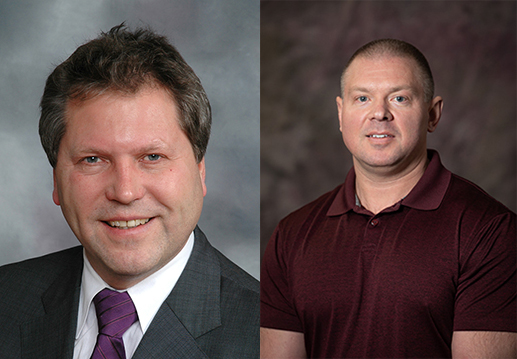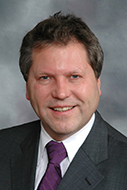Veterinary research team receives $11.3 million grant to establish infectious disease research center
Tuesday, June 2, 2020

From left: Jürgen Richt, left, is director, and Philip Hardwidge is co-director of the new Center on Emerging and Zoonotic Infectious Diseases at Kansas State University, supported by an $11.3 million grant under the Centers of Biomedical Research Excellence program of the National Institutes of Health.
MANHATTAN — The National Institutes of Health is awarding a Kansas State University-led team of veterinary researchers with a prestigious five-year, $11.3 million grant under the Centers of Biomedical Research Excellence, or COBRE, program to establish a new Center on Emerging and Zoonotic Infectious Diseases, or CEZID.
The center will comprise four primary research projects that will bridge areas of excellence in the collective infectious diseases programs at Kansas State University involving the colleges of Veterinary Medicine and Arts and Sciences.
"Our projects will examine virulence factors and host-pathogen interactions of various pathogens, utilizing both basic and translational approaches in in vitro systems and in models," said Jürgen Richt, Regents distinguished professor at Kansas State University and a Kansas Bioscience Authority eminent scholar in the College of Veterinary Medicine. Richt will serve as director of the center. Philip Hardwidge, professor of diagnostic medicine and pathobiology in the College of Veterinary Medicine, will serve as associate director.
"The overarching goal of the CEZID is to advance our overall understanding of emerging and zoonotic infectious diseases based on research performed in the state of Kansas," Richt said. "Our goals are also clearly aligned with NIH's strategic plan "Turning Discovery into Health.'"
"The truly unique and competitive advantage of the CEZID program is that it brings a multipronged and multidisciplinary approach to understanding and attacking zoonotic infectious diseases," said Peter Dorhout, vice president for research at K-State. "Our ability to better understand how these diseases behave, which include the family of coronaviruses that comprises our current global pandemic, will enable our researchers to create rapid responses to future calamitous outbreaks that affect both human and animal health. These teams will deliver science-based solutions to improve people's lives."
Richt said there will be two research core facilities to support the research projects and programs: an Animal Model/Pathology Core and a Molecular and Cellular Biology Core, offering unique research infrastructure resources at Kansas State University and the state of Kansas.
The success and growth of CEZID will be enabled through various programs:
• A faculty mentoring program that will provide outstanding mentoring of the research project leaders by nationally and internationally recognized mentors.
• New faculty recruitment at K-State within the center's mission space to ensure the growth and sustainability of CEZID.
• A pilot grant program that will promote center growth by funding smaller projects at universities in the state of Kansas.
• A regional scientific network that will provide interdisciplinary and interinstitutional collaborations and will ensure increased usage of CEZID's core facilities and access to additional core facilities, and training opportunities at universities in the state of Kansas and surrounding states.
According to Richt, these Center on Emerging and Zoonotic Infectious Diseases programs will be the basis by which research productivity is enabled and supported, helping to advance the overall success and reputation of CEZID core projects, pilot projects, postdoctoral fellows and graduate students, and center faculty.
Hardwidge said the Center on Emerging and Zoonotic Infectious Diseases has the potential to provide a vital service to the nation in the area of infectious disease research.
"In this era, interest in the control of the spread of infectious diseases is obviously of substantial importance both within the scientific community and in the general population, Hardwidge said. "We believe this center can greatly expand our general ability to respond effectively to future outbreaks."


